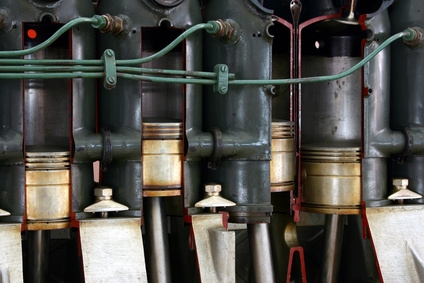
The Chevrolet Astro (produced from 1985 to 2005) was a capable people carrier when new, but time has certainly taken its toll on more than a few; decades of bad gasoline, leaking valve seals and debris in the engine can easily decrease engine efficiency. However, hope is nigh; most Astros used GMs corporate 4.3L "4300 series" V6, known affectionately as the "3/4 small-block" for its architectural similarity to Chevrolet's seminal V8. As such, most components designed for the small block will retrofit to the 4.3L used in Astros.
Even from the factory the 4.3L's ignition system had room for improvement and decades of dry rot to the plug wires and wear to the distributor haven't helped matters any. The ignition system is crucial to delivering good fuel mileage; a weak spark equals unburned fuel passing through the engine, which equates to bad fuel mileage. Hit up your favorite aftermarket supplier (like MSD, Pertronix or Streetfire) for a distributor upgrade kit (which includes the cap, rotor, new advance springs and possibly an ignition module), 8 mm high-performance spark plug wires and a high powered ignition coil. Take your pick where spark plugs are concerned, but any platinum-tipped unit will far outperform your stock AC Delco plugs.
All Astros came with old-style fluid clutch-driven cooling fans, which hurt fuel mileage even more as they age. Instead of replacing the fan clutch, get rid of it altogether and install a set of aftermarket cooling fans. You could adapt a set of stock fans, but make sure to buy a thermally-actuated on/off switch to operate them. Leaving the fans on all the time will sap power from your ignition system, and having to flip a switch every time you hit traffic will get old quickly
The small block Chevy on which your 4.3L is based has been powering GM autos reliably for decades, but it does have a few weak points. The valve stem seals on many small blocks are known to develop leaks over time, allowing oil to leak into the combustion chamber and cook into a charcoal-like deposit. Treat your engine with the Marine solvent Seafoam, which dissolves those deposits and increases engine efficiency. Check the resources section at the bottom of this article for a tutorial.
Two tried and true methods for increasing or restoring fuel mileage are also used to make horsepower. The Astro's intake and exhaust system were designed by committee for silent running and low cost -- there's plenty of room for improvement if you don't mind a little extra personality from your van. At the very least, consider installing an aftermarket catalytic converter-back exhaust and a conical-style aftermarket air filter to replace your undoubtedly worn stock unit. Taken together, these upgrades will prove themselves worth between 10 and 20 horsepower and a few bucks a week at the pump.